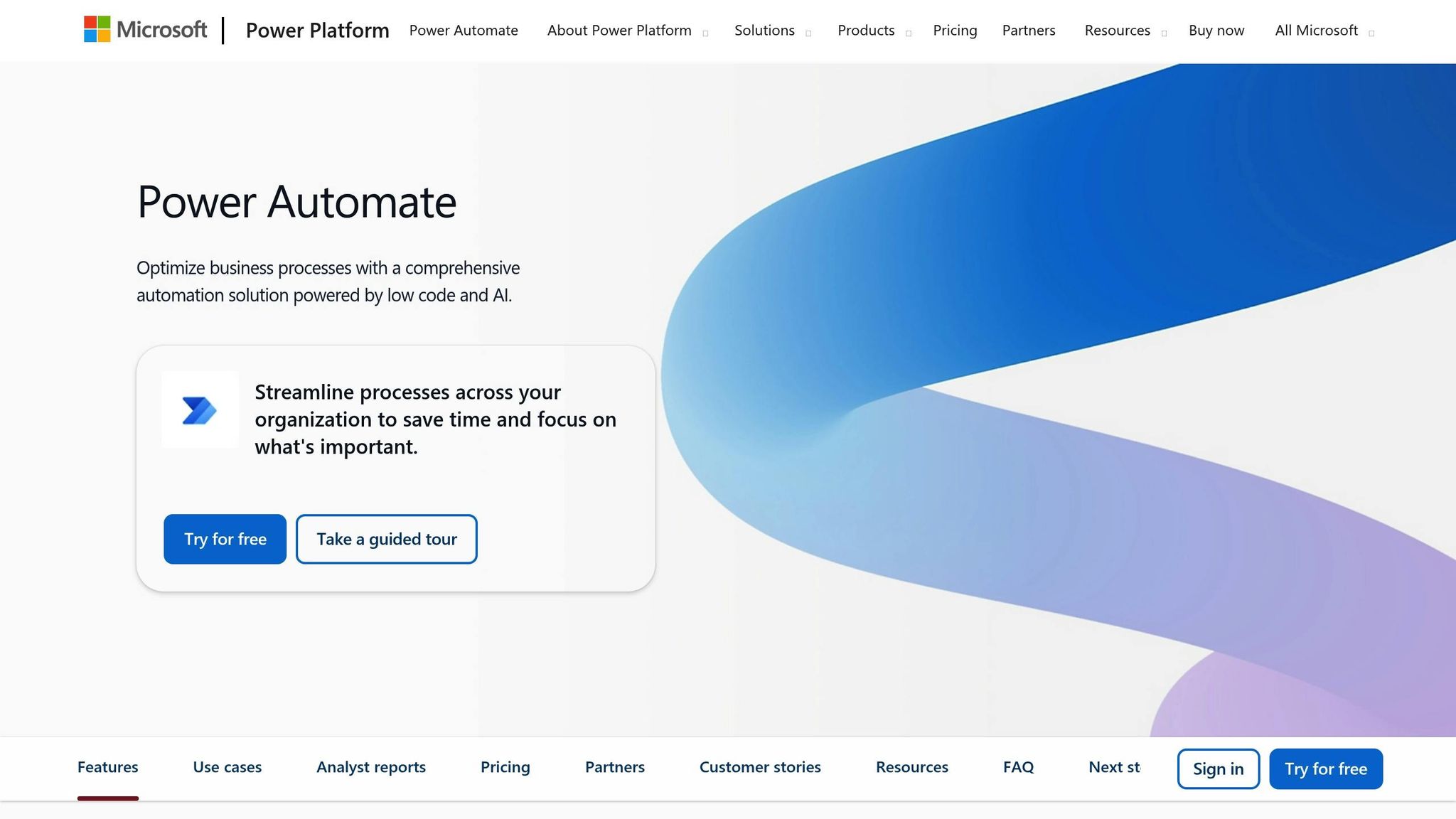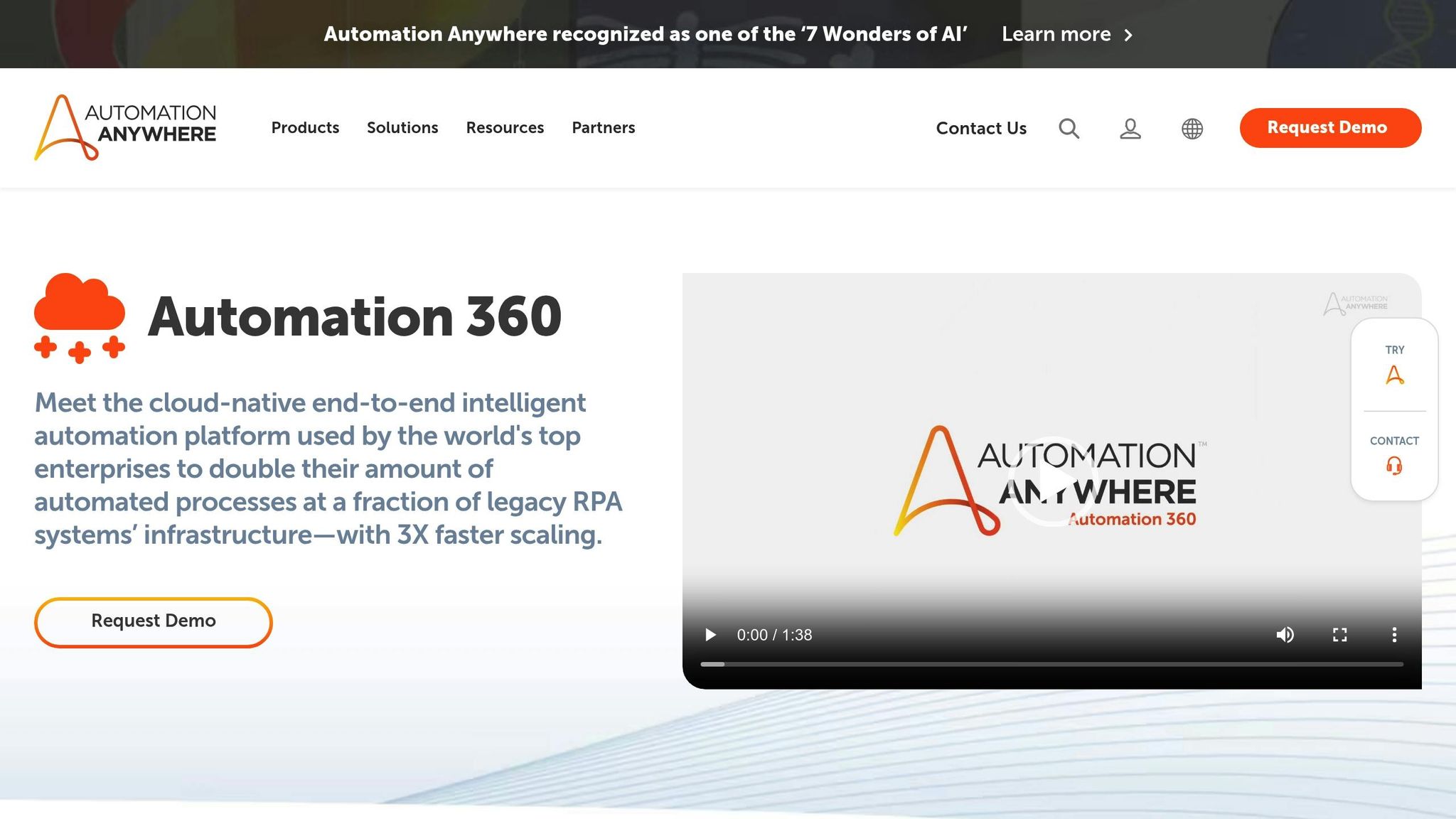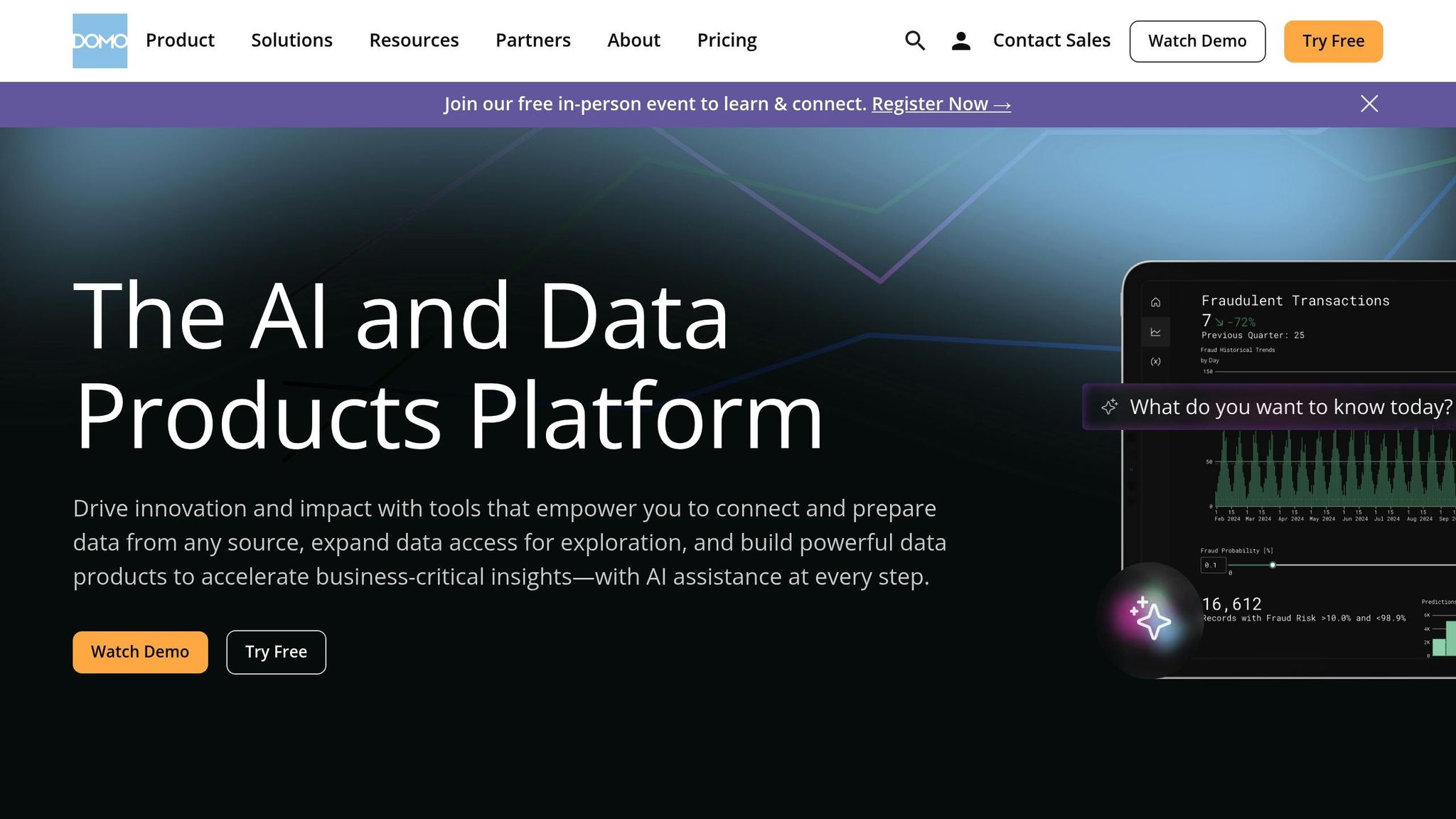
Managing enterprise AI workflows in 2025 is no longer optional - it’s a necessity for U.S. businesses to stay competitive. With fragmented tools draining resources and creating security risks, organizations are searching for platforms that simplify AI management while delivering cost control, scalability, and security. Here’s a quick look at the top providers:
Quick Takeaway: Prompts.ai stands out for its centralized LLM management and unmatched cost savings, while other platforms excel in specific niches like RPA or analytics. Below, we compare their features and benefits in detail.

Prompts.ai is an AI orchestration platform designed to give enterprises a streamlined way to manage their AI tools. By addressing the common challenges of fragmented AI systems, it provides a centralized solution that simplifies workflows and enhances efficiency. Here’s how Prompts.ai is redefining AI workflow management for businesses.
One of Prompts.ai's standout features is its ability to bring together over 35 leading large language models within a single interface. These include GPT-5, Claude, LLaMA, Gemini, Grok-4, Flux Pro, and Kling. This eliminates the need for multiple subscriptions, APIs, or scattered workflows. Teams can switch between models effortlessly, maintaining their existing processes without having to adapt to new interfaces.
This streamlined approach not only saves time but also minimizes disruptions to established business workflows, making it an ideal solution for large organizations with intricate systems already in place.
Prompts.ai is built to grow with your organization. Its architecture allows businesses to scale from small teams to enterprise-wide operations without requiring significant infrastructure adjustments. Adding new models, users, or teams takes just minutes, enabling rapid expansion without the typical delays or complications.
The platform’s pay-as-you-go TOKN credit system further supports scalability by aligning costs with actual usage. This eliminates hefty upfront subscriptions and ensures organizations pay only for what they use. Such flexibility makes it easier to justify AI investments to stakeholders, especially in growing enterprises.
Prompts.ai offers unmatched flexibility by enabling seamless comparisons between large language models. With access to advanced models, enterprises can select the most suitable AI for specific tasks. The platform provides side-by-side performance comparisons, empowering teams to make informed, data-driven decisions.
The unified interface also ensures that when new models are introduced, they can be tested and deployed immediately without additional integration work. This keeps businesses ahead of the curve, ensuring they can take advantage of the latest AI advancements without delays.
Prompts.ai doesn’t just simplify workflows - it also delivers measurable savings. Its built-in FinOps layer tackles one of the biggest challenges in enterprise AI: managing costs. Organizations can cut AI software expenses by up to 98% compared to maintaining separate AI subscriptions. Real-time cost tracking allows businesses to monitor spending across teams, projects, and use cases, enabling precise budget allocation and ROI analysis.
This level of transparency extends down to token-level tracking, giving finance teams the detailed data they need for accurate forecasting and financial planning. By providing clear insights into AI spending, Prompts.ai helps businesses maximize their return on investment and demonstrate the value of their AI initiatives.

Microsoft Power Automate, part of the Microsoft 365 suite, is a workflow automation platform that integrates AI to help enterprises streamline processes across their technology ecosystems. Here's a closer look at how its features enable seamless connectivity, scalability, AI integration, and cost management.
Power Automate bridges the gap between isolated systems with its extensive library of pre-built connectors. These connectors link Microsoft products with a wide range of third-party applications, ensuring smooth data exchange and cohesive workflows across platforms.
The platform's AI Builder makes it easy for teams to integrate AI into their processes without requiring advanced technical skills. Features like document processing, sentiment analysis, and object detection can be added directly to workflows, enhancing automation without requiring a complete system overhaul. This makes it a practical choice for businesses looking to enrich existing operations with AI.
Designed for enterprise use, Power Automate's cloud infrastructure adjusts automatically to handle increased workflow demands while maintaining reliable performance across multiple regions.
The platform supports both attended and unattended automation, offering flexibility for varied technology environments. Desktop flows enable automation for legacy systems that lack modern APIs, while cloud flows handle web-based and SaaS applications. This dual capability ensures businesses can manage diverse technology stacks with ease.
Power Automate incorporates AI through its AI Builder and connections to services like Azure OpenAI Service. These integrations allow businesses to leverage natural language processing, text generation, and content analysis within their workflows.
From automating document handling to responding to customer inquiries, the platform simplifies complex tasks. With advanced features like Microsoft Copilot, users can describe the automation they need in plain language, and the system will generate the corresponding workflow logic - making automation more accessible than ever.
Power Automate offers flexible pricing options, including per-user and per-flow plans, with bundled access often available for Microsoft license holders.
This adaptable pricing structure allows businesses to align costs with actual usage, making it ideal for organizations with fluctuating automation needs or those exploring AI-driven processes. Additionally, its integration with existing Microsoft infrastructure minimizes the need for extra hardware or separate cloud services, providing further savings for enterprises.

Automation Anywhere Automation 360 offers a robust RPA platform enhanced with AI capabilities, designed for enterprise-level automation needs.
This platform stands out with its Bot Store, which provides pre-built automation packages ready for deployment. Its Universal Recorder captures user actions seamlessly across web, desktop, and terminal environments, making it versatile for different workflows. Additionally, its API-first design ensures smooth custom integrations, allowing businesses to tailor the platform to their unique requirements.
Built on a cloud-native infrastructure, Automation 360 adapts effortlessly to changing operational demands. A centralized control room simplifies deployment and monitoring of automation across various departments, while built-in load distribution ensures optimal performance, even during peak usage. This scalability makes it an ideal choice for organizations with diverse and growing needs.
The platform leverages AI to streamline complex tasks. For example, it uses machine learning to handle unstructured data, making processes like invoice handling and contract analysis faster and more efficient. Additionally, it features natural language interfaces, enabling users to interact with the system in a more intuitive and user-friendly manner.
Automation 360 offers flexible, subscription-based licensing options that cater to both unattended automation and bot development. For those looking to explore its capabilities, a Community Edition is available, providing an accessible way to evaluate the platform before committing to a full subscription.

Domo combines data visualization with AI analytics to empower businesses with smarter, data-driven decision-making. Let’s dive into how its standout features ensure smooth integration, adaptable performance, and user-friendly analytics.
Domo is built to connect seamlessly with a wide range of data sources, from older legacy systems to modern cloud-based applications. This flexibility allows users to integrate analytics directly into their existing workflows and tools, providing easy access to insights across multiple platforms without disrupting operations.
Powered by a cloud-based infrastructure, Domo effortlessly scales to accommodate growing data volumes and user demands. Its architecture ensures dashboards are consistently updated with real-time data, enabling organizations to make decisions based on the most current information available.
With integrated natural language processing (NLP), Domo allows users to interact with their data using plain language queries. This feature simplifies complex analytics, making insights accessible even to those without technical expertise, broadening its usability across teams.
Domo operates on a subscription-based pricing model, offering businesses the flexibility to explore its features through an accessible trial period. This approach allows organizations to evaluate its value before committing to a long-term plan, ensuring it aligns with their needs and budgets.
Each provider presents a distinct set of strengths and challenges when it comes to shaping an enterprise AI strategy. Using criteria such as interoperability, scalability, LLM integration, and cost efficiency, the table below compares their performance.
| Provider | Interoperability | Scalability | LLM Integration | Cost Efficiency |
|---|---|---|---|---|
| Prompts.ai | ✅ Excellent: Unified interface for 35+ LLMs | ✅ Excellent: Pay-as-you-go TOKN credits scale with actual usage | ✅ Outstanding: Direct access to GPT-5, Claude, LLaMA, Gemini | ✅ Exceptional: Up to 98% cost reduction compared to individual subscriptions |
| Microsoft Power Automate | ✅ Strong: Deep integration with Microsoft 365 and the Azure ecosystem | ✅ Strong: Enterprise-grade infrastructure with automatic scaling | ✅ Good: Integration with Azure OpenAI and Copilot services | ✅ Moderate: Competitive pricing within the Microsoft ecosystem, though limited outside this scope |
| Automation Anywhere | ✅ Strong: Comprehensive API framework | ✅ Excellent: Architecture designed for large-scale deployments | ✅ Moderate: Basic AI capabilities with some LLM integrations | ✅ Case-dependent: Cost-effective at scale, though initial investments may be high |
| Domo | ✅ Good: Connects with a wide range of data sources and legacy systems | ✅ Strong: Cloud-based infrastructure scales with data volume | ✅ Basic: Natural language processing for data queries | ✅ Flexible: Subscription model with trial options, though ongoing monthly fees apply |
The table highlights how these platforms address key enterprise AI needs, offering insights into their varied approaches. Prompts.ai stands out for its seamless LLM integration and cost-saving potential, enabling businesses to access multiple AI models through a single platform. Microsoft Power Automate, on the other hand, thrives within its ecosystem, providing deep integration with Microsoft tools, though it may face challenges when working with non-Microsoft systems. Automation Anywhere excels in large-scale automation, but its primary focus on robotic process automation makes it less suited for advanced language model workflows. Finally, Domo shines in data visualization and analytics, though it may fall short when it comes to comprehensive AI orchestration.
Despite their strengths, a shared limitation emerges: most traditional platforms operate independently across SaaS tools, databases, and AI models. This fragmented approach often leads to higher costs and inefficiencies, as organizations must invest in multiple tools rather than adopting a unified AI strategy.
After reviewing the top enterprise AI providers for 2025, Prompts.ai emerges as a compelling choice for organizations aiming for a streamlined and cost-conscious AI strategy. With access to over 35 leading language models through a single, secure interface, Prompts.ai offers a pay-as-you-go system powered by TOKN credits, ensuring businesses only pay for what they use. This approach combines flexibility with transparency, making it an attractive option for enterprises of all sizes.
For companies deeply integrated with Microsoft tools, Microsoft Power Automate provides seamless connections with platforms like Office 365 and Azure. This tight alignment can boost workflow efficiency, though its functionality may be more constrained when operating outside the Microsoft ecosystem. It’s a strong choice for those already committed to Microsoft services but may require complementary tools for broader automation needs.
Automation Anywhere Automation 360 is specifically designed for large-scale robotic process automation (RPA). While it delivers powerful solutions for extensive deployments, smaller businesses may face challenges with the upfront investment and the complexity of integrating advanced language model features. This makes it better suited for enterprises with significant automation demands.
When it comes to data visualization and analytics, Domo stands out for its ability to connect diverse data sources and present insights in a clear, actionable way. Businesses prioritizing analytics may find Domo to be an excellent fit. However, companies seeking end-to-end AI workflow automation - including integrated language model capabilities - might need to pair Domo with additional tools to achieve their goals.
In contrast to traditional solutions that often require juggling multiple subscriptions and navigating complex governance, Prompts.ai takes a unified approach. It offers enterprise-grade security, compliance features, and real-time cost controls - key benefits for U.S.-based businesses operating under strict regulatory standards.
For organizations just beginning their AI journey, adopting a scalable platform like Prompts.ai simplifies growth. It allows teams to expand AI access while maintaining centralized oversight and clear cost management, providing the flexibility to adapt as business needs evolve.
Prompts.ai enables businesses to cut AI software expenses by as much as 98% through a single, unified platform. This platform grants access to over 35 AI models under one subscription, simplifying management and reducing costs. With its pay-per-use TOKN credit system, you only pay for the resources you use, removing the burden of juggling multiple expensive subscriptions. On top of that, its real-time cost optimization enhances workflow efficiency, making it an economical and effective choice for enterprise AI solutions.
Prompts.ai works seamlessly with over 35 large language models (LLMs), providing organizations with a unified platform to integrate and manage diverse AI workflows. This streamlined approach simplifies operations, increases efficiency, and helps cut down on operational expenses.
With its support for a broad range of LLMs, Prompts.ai empowers teams to collaborate in real time, strengthens oversight across AI systems, and speeds up data processing and decision-making. These features enable businesses to enhance productivity, spark new ideas, and stay ahead in a world increasingly shaped by AI advancements.
The TOKN credit system operates on a pay-as-you-go model, enabling businesses to purchase credits for accessing AI services as needed. This setup means you only pay for what you use, avoiding upfront expenses and minimizing the risk of overestimating your requirements.
With real-time usage tracking, the system offers flexible cost management and effortless scalability. It's a practical solution for businesses looking to expand operations or streamline budgets, ensuring resources are allocated efficiently while driving growth.


